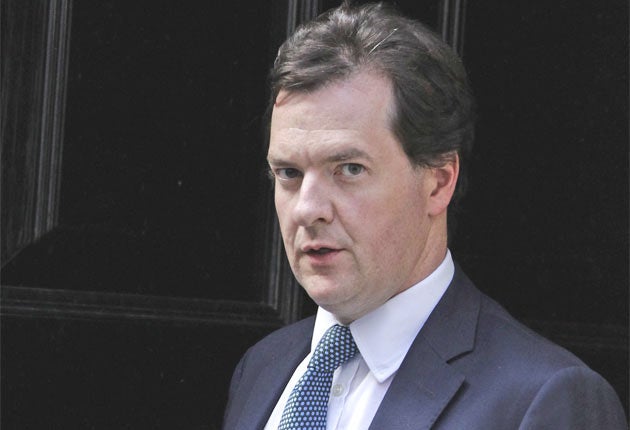Defiant Osborne says we'll tough it out without economic Plan B

Your support helps us to tell the story
From reproductive rights to climate change to Big Tech, The Independent is on the ground when the story is developing. Whether it's investigating the financials of Elon Musk's pro-Trump PAC or producing our latest documentary, 'The A Word', which shines a light on the American women fighting for reproductive rights, we know how important it is to parse out the facts from the messaging.
At such a critical moment in US history, we need reporters on the ground. Your donation allows us to keep sending journalists to speak to both sides of the story.
The Independent is trusted by Americans across the entire political spectrum. And unlike many other quality news outlets, we choose not to lock Americans out of our reporting and analysis with paywalls. We believe quality journalism should be available to everyone, paid for by those who can afford it.
Your support makes all the difference.In boastful mood last night George Osborne said the Government's tough deficit-reduction strategy meant Britain was "master of its own destiny" unlike other European nations which were at the mercy of the financial markets. In a defiant speech to the Lloyds insurance market in London, the Chancellor conceded that all countries had had to "revise down our short-term expectations over recent weeks".
That was a clear signal that the Office of Budget Responsibility would scale down its growth forecasts on 29 November, when the Chancellor publishes his autumn statement. He is expected to unveil a raft of measures designed to boost growth, some of which may be trailed at next month's Conservative Party conference.
Last night he argued that the lesson of the summer was that Britain had not suffered the same wobbles as Italy, Spain and France because the Government enjoyed the confidence of the financial markets.
Ruling out an economic "Plan B" or the "Plan A plus" favoured by some Liberal Democrats, Mr Osborne said: "The plan we have set out is designed in tough times for tough times. It is the rock of stability upon which any sustainable recovery depends and we will hold to it. We had an emergency budget last summer on our own terms – not this summer on the market's terms —unlike so many other countries. We have been ahead of the curve."
The Chancellor admitted Britain was "not immune from what happens on our doorstep." But he insisted: "We can remain masters of our own destiny." His assertion could make it harder to blame the weak growth in the UK on the global storms unless the economy picks up.
Labour seized on reports that G7 finance ministers, who meet in Marseilles this week, may encourage global growth by calling on countries to slow the pace of fiscal consolidation in the short term where that is possible. Labour has consistently criticised the Government's spending cuts as going "too far, too fast" and killing the recovery.
Ed Balls, the shadow Chancellor, told Mr Osborne in the Commons: "Unemployment is rising [and] the stock market is plummeting." He repeated Labour's call for a tax on bankers' bonuses to create jobs for young people.
Mr Osborne taunted Mr Balls over the memoirs of Alistair Darling, the former Labour Chancellor. He said: "It's not even been published yet and they [Labour] are going to be hearing a lot more about that book in the months ahead, because it reveals the truth, not just about the last government, but about how the shadow Chancellor operated in the last government – the poisoned politics, the paralysed government and the lack of a credible economic policy."
David Cameron told the Liaison Committee of senior MPs said that the Government was "backing those [eurozone] countries who want to make the euro work, because it is in our interests... I think that they will probably do what it takes – albeit perhaps in fits and starts – to make sure that it continues."
Join our commenting forum
Join thought-provoking conversations, follow other Independent readers and see their replies
Comments